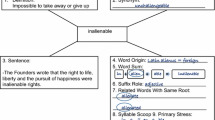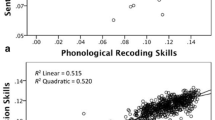Abstract
Almost half of American adults struggle with reading but there is a dearth of reading-related assessments for these adults. In turn, researchers and practitioners use assessments designed for children with these adults. This study examined the psychometric and descriptive attributes of the Comprehensive Test of Phonological Processing (CTOPP) Elision and Blending Words subtests with struggling adult readers. The sample included 207 native English speaking adults reading between the third- and fifth-grade levels. Analyses included comparisons of struggling adult readers to the CTOPP norm group. Results revealed lower overall performance and reliability and validity for struggling adult readers compared to the norm group. In addition, analyses included comparisons of performance, reliability, and validity within the group of struggling adult readers by age. The older adults had lower overall performance as well as more questionable reliability and validity. This study raises concern about administering and interpreting Elision and Blending Words subtests with struggling adult readers.
Similar content being viewed by others
References
Cronbach, L. J. (1951). Coefficient alpha and the internal structure of tests. Psychometrika, 16, 297–334.
Durgunoglu, A. Y., & Oney, B. (2002). Phonological awareness in literacy acquisition: It’s not only for children. Scientific Studies of Reading, 6, 245–266.
Frederick, M., & Markwardt, T. (1997). Peabody Individual Achievement Test-Revised. Circle Pines, MN: American Guidance Service.
Greenberg, D., Ehri, L. C., & Perin, D. (1997). Are word-reading processes the same or different in adult literacy students and third-fifth graders matched for reading level? Journal of Educational Psychology, 89, 262–275.
Greenberg, D., Ehri, L. C., & Perin, D. (2002). Do adult literacy students make the same word-reading and spelling errors as children matched for word-reading age? Scientific Studies of Reading, 6, 221–243.
Greenberg, D., Pae, H., Morris, R., Calhoon, M. B., & Nanda, A. O. (2009). Measuring adult literacy students’ reading skills using the Gray Oral Reading Test. Annals of Dyslexia, 59, 133–149. doi:10.1007/s11881-009-0027-8.
Greenberg, D., Wise, J., Morris, R., Fredrick, L., Rodrigo, V., Nanda, A., et al. (2011). A randomized-control study of instructional approaches for struggling adult readers. Journal of Research on Educational Effectiveness, 4, 101–117. doi:10.1080/19345747.2011.555288PubMed#22180789.
Hock, M. F., & Mellard, D. F. (2011). Efficacy of learning strategies instruction in adult education. Journal of Research on Educational Effectiveness, 4, 134–153. doi:10.1080/19345747.2011.555291.
Kutner, M., Greenberg, E., Jin, Y., Boyle, B., Hsu, Y., & Dunleavy, E. (2007). Literacy in everyday life: Results from the 2003 National Assessment of Adult Literacy (NCES Report 2007-480). Retrieved from http://nces.ed.gov/pubsearch/pubsinfo.asp?pubid=2007480.
Mellard, D. F., Fall, E., & Woods, K. L. (2010). A path analysis of reading comprehension for adults with low literacy. Journal of Learning Disabilities, 43, 154–165. doi:10.1177/0022219409359345.
Nanda, A., Greenberg, D., & Morris, R. (2010). Modeling child-based theoretical reading constructs with struggling adult readers. Journal of Learning Disabilities, 43, 139–153. doi:10.1177/0022219409359344PubMed#20179308.
National Institute of Child Health and Human Development. (2000). Report of the National Reading Panel. Teaching children to read: An evidence-based assessment of the scientific research literature on reading and its implications for reading instruction: Reports of the subgroups (NIH Publication No. 00-4754). Washington, DC: U.S. Government Printing Office.
Pae, H. P., Greenberg, D., & Morris, R. D. (2012a). Construct validity and measurement invariance of the Peabody Picture Vocabulary Test-III Form A. Language Assessment Quarterly, 9, 152–171.
Pae, H. P., Greenberg, D., & Williams, R. S. (2012b). An analysis of differential response patterns on the Peabody Picture Vocabulary Test-IIIB in struggling adult readers and third-grade children. Reading and Writing: An Interdisciplinary Journal, 25, 1239–1258.
Patterson, M. B. (2008). Learning disability prevalence and adult education program characteristics. Learning Disabilities Research & Practice, 23, 50–59.
Perfetti, C. A., & Hart, L. (2002). The lexical quality hypothesis. In C. Verhoeven, C. Elbro, & P. Reitsma (Eds.), Precursors of functional literacy (pp. 189–213). Amsterdam: John Benjamins.
Perin, D. (1991). Test scores and adult literacy instruction: Relationship of reading test scores to three types of literacy instruction in a worker education program. Language and Literacy Spectrum, 1, 46–51.
Read, C., & Ruyter, L. (1985). Reading and spelling skills in adults of low literacy. Remedial and Special Education, 6(6), 42–53.
Sabatini, J. (2002). Efficiency in word reading of adults: Ability group comparisons. Scientific Studies of Reading, 6, 267–298.
Thinkfinity Literacy Network. (n.d.). Adult literacy print resources. Retrieved June 18, 2008, from http://literacynetwork.verizon.org/Adult-Literacy.109.0.html.
Torgesen, J. K., & Wagner, R. K. (1999). Test of Word Reading Efficiency. Austin, TX: Pro-Ed.
Torgesen, J. K., Wagner, R. K., Rashotte, C. A., Burgess, S., & Hecht, S. (1997). Contributions of phonological awareness and rapid automatic naming ability to the growth of word-reading skills in second-to fifth-grade children. Scientific Studies of Reading, 1, 161.
Venezky, R. L., & Sabatini, J. P. (2002). Introduction to this special issue: Reading development in adults. Scientific Studies of Reading, 6, 217–220. doi:10.1207/S1532799XSSR0603_1.
Wagner, R. K., Torgesen, J. K., & Rashotte, C. A. (1999). Comprehensive Test of Phonological Processing. Austin, TX: Pro-Ed.
Weiderholt, J. L., & Bryant, B. R. (2001). Gray Oral Reading Tests-Fourth Edition. Austin, TX: Pro-Ed.
Wolf, M., & Bowers, P. G. (1999). The double-deficit hypothesis for the developmental dyslexias. Journal of Educational Psychology, 91, 415–438.
Woodcock, R. W., McGrew, K. S., & Mather, N. (2001). Woodcock-Johnson III: Tests of achievement. Itasca, Il: Riverside Publishing.
Acknowledgments
This paper represents part of a larger study that was supported by the Eunice Kennedy Shriver National Institute of Child Health and Human Development, the National Institute for Literacy, and the U.S. Department of Education, Office of Vocational and Adult Education—grant # R01 HD43801.
Author information
Authors and Affiliations
Corresponding author
Rights and permissions
About this article
Cite this article
Nanda, A.O., Greenberg, D. & Morris, R.D. Reliability and validity of the CTOPP Elision and Blending Words subtests for struggling adult readers. Read Writ 27, 1603–1618 (2014). https://doi.org/10.1007/s11145-014-9509-0
Published:
Issue Date:
DOI: https://doi.org/10.1007/s11145-014-9509-0




